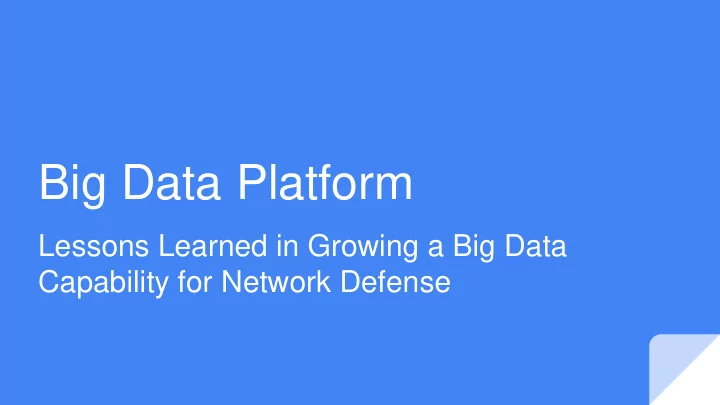

Big Data Platform Lessons Learned in Growing a Big Data Capability for Network Defense
Who am I? - Technical Director, Enlighten IT Consulting, a MacAulay-Brown company - Software Engineering Consultant - Helped found Apache Rya - Chief Architect of DoD’s Big Data Platform - Currently working for: - Defense Information Systems Agency (DISA) - Army Cyber Command - US Cyber Command - Center for Army Analysis - Air Force
Talk Overview - DCO Big Data Problem Space - DoD’s Big Data Platform - Scaling for Big Data - Multi-Tenancy - Lessons Learned
Problem Space - Huge variety of DCO sensors - Heterogeneous data formats - No enterprise standardization on infrastructure - Petabyte scale storage/retention/analysis requirements - No single “out of the box” COTS, GOTS, or OSS solution by itself meets the unique DoD cyber security challenges - Enabling collaborative investigation while eliminating redundant efforts
Problem Space
What is the BDP? - A cloud-based distributed architecture for ingesting and storing large datasets, building analytics, and visualizing the results. - Allows critical decisions to be made based on rich and broad data. - Developed around open source and unclassified components while leveraging community tech transfer from other DoD entities. - DISA-controlled software baseline - RMF accredited with current Authority To Operate in multiple organizations - 99% open source, specifically integrated to meet DoD’s needs
Big Data Platform Technology Stack
Scaling for Volume and Velocity
Multi Tenancy (Learning to share) - HDFS / Accumulo (Storage) - Analytics - Spark - Streaming- Kafka/Storm - RShiny - Web Applications - Jetty - NodeJS - Microservices - Spring/Java/NodeJS - Ingest
Lesson Learned: It’s all about the data - Don’t underestimate the difficulty of collecting and sharing data - End user analytic questions have to drive data priorities - You can’t wait to start collecting data until you need to use it - *Just enough* normalization will allow unplanned correlations to emerge - Data from many vantage points increases the value (but analysts need to understand the vantage point of each)
Lesson Learned: Use commercial cloud infrastructure - It lets your engineering teams focus on your problems not on infrastructure - It provides “just in time” capacity that reduces costs in the long run - It has a refresh rate that is much more frequent than traditional in-house data centers - It reduces barriers for data transport and acquisition
Lesson Learned: Standardize your platform early, but evolve it - Organizations can share security accreditation - Shared data structures will encourage correlations - Be willing to change and evolve, without reinventing everything every time - Create and document APIs that encourage reuse - Leverage a community to share costs
Lesson Learned: Analytics need to scale - Need to run on commodity hardware (if you can fit all your data into memory, you don’t have big data) - Need to be parallelizable - Need to handle preemption (half your job may be killed at any moment to make way for higher priority tasks) - Need to be secure (can’t open ports, store passwords; need to handle data security controls)
Lesson Learned: You need to optimize your load - Use batch ingest - Cache data near the web tier - Adjust the allocation of resources to your mission (YARN is great, but it needs to be managed) - Test with real world datasets (size and variety) - Understand the computational costs of your analytics before deploying them
Questions?
Recommend
More recommend